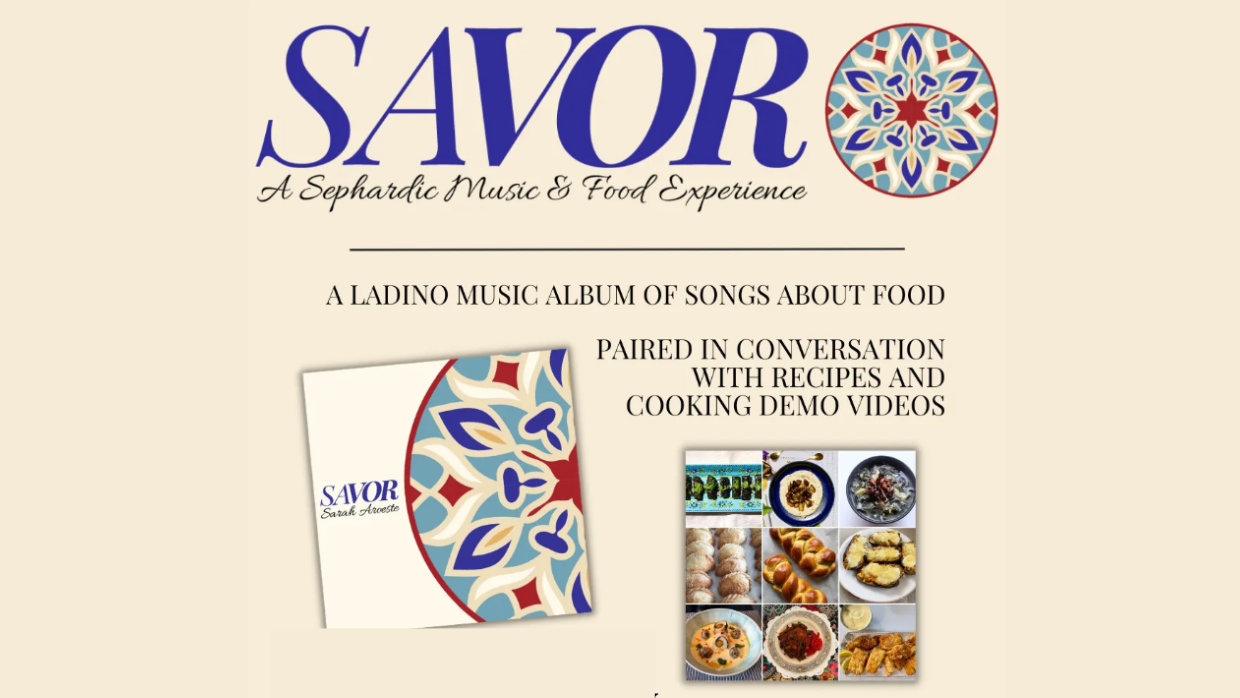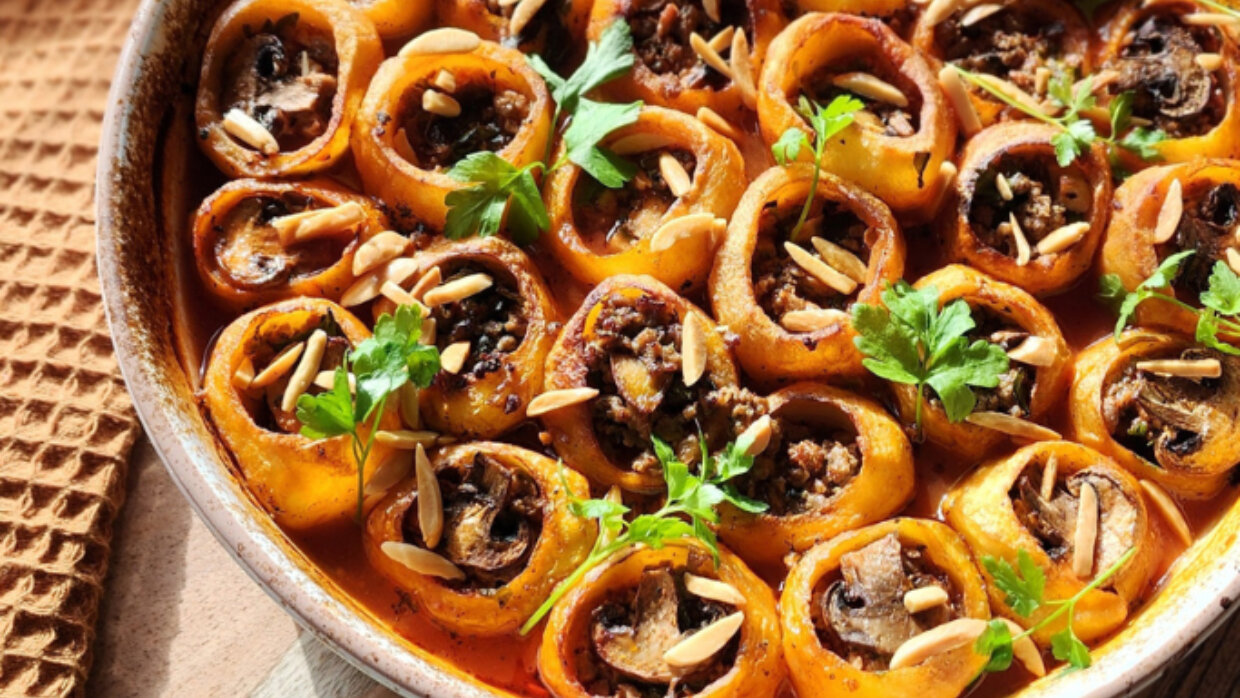In an era when cultural heritage and traditions can be savored with accessibility previously unimaginable, a novel project, "Savor: A Sephardic Food and Music Experience," offers a globally accessible, tantalizing journey into the heart of Sephardic Jewish heritage.
Created by the duo Sarah Aroeste, a renowned Ladino singer, and Susan Barocas, a distinguished chef, "Savor" introduces the richness of Sephardic culinary culture and music, where flavors and melodies marry to reawaken centuries-old traditions.
 Sarah and Susan cooking at a Savor event. Courtesy Sarah Aroeste
Sarah and Susan cooking at a Savor event. Courtesy Sarah Aroeste
Launched back in April, the women-led project transcends geographical boundaries and welcomes audiences from all walks of life into the vibrant world of Sephardic culinary tradition. Featuring ten distinct Sephardic dishes, each a timeless culinary artifact, "Savor" provides an opportunity for every culinary enthusiast to connect with Sephardic culture, whether they're acquainted with it or not, and from the comfort of their kitchens.
 Lunch with leaders of the Athens Jewish community. Courtesy Susan Barocas
Lunch with leaders of the Athens Jewish community. Courtesy Susan Barocas
"One of our goals is to take Savor beyond the Sephardic and Jewish communities. We hope to be able to help people learn and enjoy the diversity of our culture through this entryway into Sephardic music and food. This is different because it's not a bagel or a brisket, especially in the US; it's a big deal to make inroads into this culinary territory," said Barocas.
From classic staples such as Burekas to more intricate plates like Komida de Berendjena (Honeyed Eggplant with Hummus) and Gayina Agristada (Chicken with Lemon Sauce), every dish is introduced by guest chefs. These culinary ambassadors share the recipes and actively nurture the Sephardic food heritage.
 Sarah leading a music workshop onboard the ship. cred Susan Barocas
Sarah leading a music workshop onboard the ship. cred Susan Barocas
Alongside, ten Ladino songs, performed by Sarah Aroeste, adorn each recipe, creating a melodic backdrop that amplifies the culinary journey where the palate meets melody every step of the way — a menu-inspired guide aids in bridging the gap between each pairing, effectively helping users understand the blend and narrative better.
In the center of Sarah and Susan's project lies a unique perspective: the understanding that tradition engages all senses. Sephardic Jewish culture, a radiant tapestry interwoven with diverse strands, transcends a mere sensory experience. Instead, it unfolds as a symphony for the senses, best appreciated through a harmonious amalgamation of taste and sound—a principle that forms the core of “Savor.”
How it All Began
It all sprouted from the isolation of the COVID-19 pandemic, with Sarah recreating her family's century-old Sephardic recipes with her children. While the process initially served as a pastime, it eventually birthed an unprecedented fusion of Sephardic music and food.
"I received this treasure trove of recipes that had been passed down in my family from my elders. And because I had so much time on my hands, I went through them and just loved cooking and couldn't get enough of it. So I started recording while cooking in the kitchen with my kids," said Aroeste.
"Like so many artists, I was pivoting; I was doing virtual concerts, and some venues asked me to incorporate Sephardic food into my virtual presentations. And that caused me to develop a whole repertoire of music in relation to food. And after the first year, I realized, oh, my gosh, there are hundreds of songs, so many songs in Ladino."
Historically, Sephardic women were the ones who adapted folk songs changing collective bodies of folk narrative melodies from romanceros (narrative ballad poems), kantikas (poetic chants) and dichas (proverbs), introducing and enriching Sephardic chants in everyday life.
These songs were shared and sung mainly among women who carried and maintained orally throughout the lands that sheltered them after the 15th-century expulsion from Spain— mostly the Ottoman Empire and countries in northern Africa such as Morocco and Algeria.
"Women have always sung communally; that was part of Sephardic culture. Together with families, in their villages and neighborhoods, everyone was singing together. So, in particular, not only are the recipes presented by women, but a lot of the songs were consciously curated by me because they were from a woman's perspective," said Aroeste.
"Many of the songs show powerful women representing the culture and the food. And I think that's beautiful. And we need to talk about it more. And these are stories that need to be told."
The "Savor" project unravels this multisensory experience through a carefully curated menu of traditional Ladino music and emblematic Sephardic dishes. Each dish and song pairing is a tribute to the rich history of different Sephardic Jewish communities, bringing their shared heritage to life. The participation of female guest chefs of varying generations and ancestry, including Leah Koenig, Hélène Jawhara Piñer, and The Sephardic Spice Girls and families sharing ancestral recipes, echoes the traditional matrilineal transmission of Sephardic culinary and musical heritage.
This remarkable synergy unveiled a compelling insight: Sephardic music and food are intimately intertwined, with food often depicted in traditional Ladino songs and serving as a vibrant reflection of the cultural norms and values from medieval Spain and all the other places the Sephardim went to in the Diaspora. For Aroeste, the gastronomic endeavor has also allowed her to step into a more traditional territory for the first time in her career.
"Nine out of the ten songs are traditional except one we wanted to pay a nod to the great late Flory Jagoda who wrote the song Chiko Ianiko. Not only has Flory been such an influence on me and Susan, we both knew her and got to eat and sing with her," said Sarah.
"She has done so much for Sephardic culture. The songs we chose are all about teaching food and music traditions to different generations. That's literally what Chiko Ianiko is about. Flory wrote it for her grandson while watching him make breakfast in the kitchen. And I just loved that visualization of a grandmother and a kid being messy in the kitchen together," said Aroeste.
While it serves as an immersive and educational voyage into Sephardic culture, "Savor" also seeks to foster a collective experience, a community celebration. The project is designed to spark conversations about Jewish food and culture, highlighting the significance of Sephardic cuisine often overshadowed by ashkenormativity.
Despite the sensory richness of the experience, Sarah and Susan emphasize that the joy of Sephardic culture is not just in the individual experiences of eating the food, cooking the meals, or listening to the music. The shared joy, the collective delight, encapsulates the spirit of Sephardic culture," said Sarah and Susan, underlining the project's ultimate aim of generating mesas de alegria, or "tables of joy" in Ladino.
x
 Our group in a cooking class in the Culinary Center onboard the Oceania Marina. Courtesy Susan Barocas
Our group in a cooking class in the Culinary Center onboard the Oceania Marina. Courtesy Susan Barocas
The pair has recently traveled to Greece and Turkey, where they took Savor on an 8-day cruise to explore the cuisine of the Ottoman Empire from Athens to Istanbul. Besides culinary trips, Susan and Sarah want to take Savor to the classroom and are currently fundraising to expand the project into a documentary and a book. "We want to start developing outreach materials and educational curricula for schools, universities, churches, synagogues, community centers, anyone who wants it," added Barocas.
 Cooking class at the MSA Culinary School in Istanbul taught by Susan and one of the Savor chefs, Istanbul-born Chef Sibel Pinto pictured with Susan. Courtesy Susan Barocas
Cooking class at the MSA Culinary School in Istanbul taught by Susan and one of the Savor chefs, Istanbul-born Chef Sibel Pinto pictured with Susan. Courtesy Susan Barocas
By creating the fusion of an album and a cookbook, Susan and Sarah pay an ode to Sephardic heritage that has withstood the test of time, adapting to the ever-changing world while staying true to their roots. It is an open invitation to everyone to partake in a gastronomic and melodious journey, celebrating the joy and resilience of Sephardic culture because, after all, food isn't only savored with the mouth but also with the ears.

















